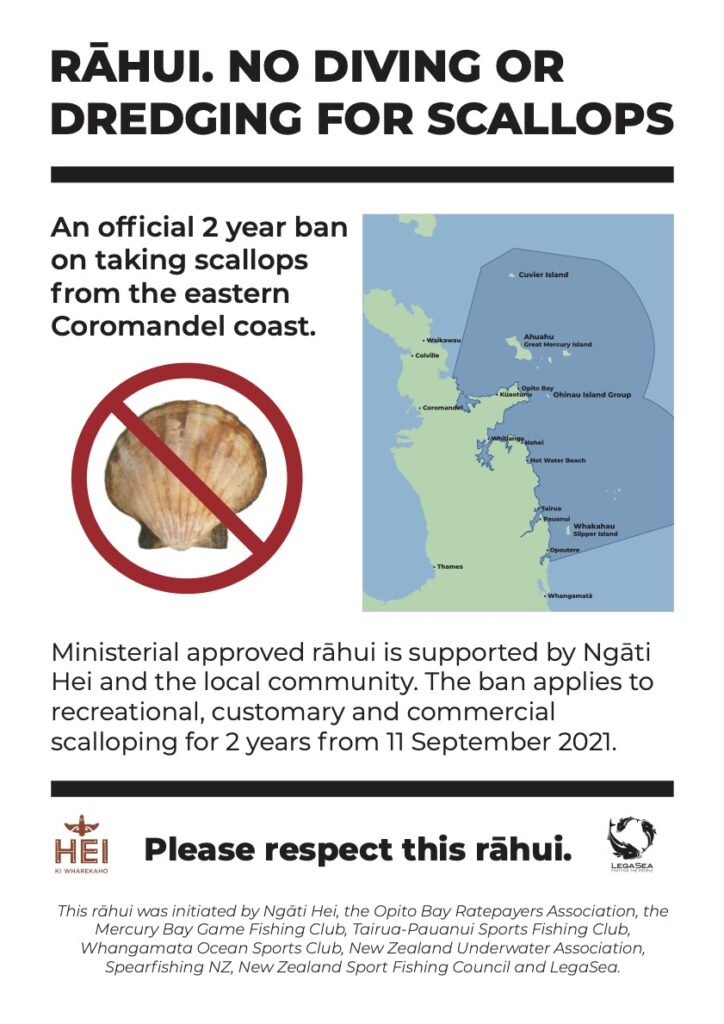There is no doubt that the implementation of the rāhui on scallops was a highlight of the 2021 year for us, with OBRA taking a leading role in the group responsible, led by Joe Davis of Ngati Hei and including Legasea, NZ Underwater Association, NZ Sport Fishing Council, Tairua-Pauanui Sports Fishing Club, Mercury Bay Fishing Club and endorsed by the other MBN Ratepayer Associations.

A short film presenting the story of the rāhui can be accessed below.
Power to the People!
Achievement of the rāhui was a brilliant example of the community working in partnership with Ngāti Hei to achieve an outstanding outcome. From the start, the Ōpito community demonstrated real commitment with their overwhelming support for the voluntary rāhui established in December 2020. This was followed up by raising $22,500 to enable the scientific survey of the beds to be carried out and Legasea to carry out their extensive planning, co-ordination and lobbying activities (of the $22,500 mention must be made of ratepayers from Matarangi and Hahei who contributed $3000 and OBRA which contributed $5,000).
After significant further project work throughout early 2021 and correspondence with the Minister of Oceans advising of our plans and proposals, a formal application for a rāhui under section 186a covering their entire rohe (shown on the above poster) was submitted on February 10th. After extensive consultation (with around 2,000 submissions), and continued pressure from Legasea and the other project partners, the application was approved on September 8th, 2021.
Throughout this process we had tremendous support from Legasea who saw this action as a great model of community and tangata whenua working together. They garnered consistent, supportive media coverage including major news outlets, related publications and a significant feature on TV1.
The rāhui is not of course the end of the matter. While we hope the 2 year closure will go some way to restoring the beds to a position of sustainability, this will need to be monitored with further surveys and experience in other beds suggest 2 years may not be enough time to achieve our initial objectives. More importantly, it is clear that commercial dredging of the beds is incompatible with our objectives of sustainability, and we have signalled that to the Minister in our letter of appreciation for his support for the rāhui which is reproduced below. There is still much to do, both in our immediate area and in the wider Hauraki Gulf.
Letter to Minister Parker
10 September 2021
Tēnā koe e te Minister Parker,
We thank you for acting decisively to protect the last, most productive scallop beds in the Coromandel waters.
As you are aware, Ngāti Hei and local communities have worked together to impose and respect a rāhui and voluntary ban on taking scallops since December 2020. Collectively we have also supported Ngāti Hei with their s186A closure application – precisely the sort of partnership you have strongly promoted.
Māori and Pakeha, locals and visitors, all worked collaboratively to send you the strong message through words and deeds that our scallop beds are in danger of going the same way as other closed and depleted beds elsewhere in Aotearoa. We value our local scallop resource and wish to save them for future generations.
We are grateful to you for respecting the Coromandel community’s efforts and appreciate the difficulties you faced in trying to resolve this issue. On the one hand you have strong community support to protect the environment and local scallop beds, and on the other you are faced with a Quota Management System that entitles commercial interests to extract up to 50,000 kilos of scallops per annum from beds that clearly cannot sustain or meet that allowable catch level.
There is strong support for you to close the Coromandel scallop fishery, including the Hauraki Gulf Marine Park, to all scallop dredging. The stark reality is, if dredging is not banned in all the Hauraki Gulf then that leaves Great Barrier and Little Barrier open to unconstrained violation.
History shows us that dredging and overfishing of scallops led to the closure of the Marlborough Sounds-Tasman Bay scallop fishery five years ago. It has not recovered and is still closed. Now, only the Northland and the few Hauraki Gulf commercial scallop fisheries remain open. Please don’t let history repeat itself.
If a dredging ban is good enough for the Coromandel, it’s good enough for the whole Gulf.
A dredge ban would also align with the Hauraki Gulf Forum’s position reaffirmed at their March meeting, “that fishing methods which damage the seafloor should be removed from the Marine Park”.
Minister, we appreciate your recent decision in support of the temporary closure and there is clearly more work to do to meet the community’s aspirations to remove bulk harvesting from inshore waters so marine life can be restored.
Nā mātou noa, nā
Joe Davis Kaitiaki, Ngāti Hei
Chris Severne
Chair, Opito Bay Ratepayers Association
Andy Stewart
Executive Board member, New Zealand Underwater Association
Bob Gutsell
President, New Zealand Sport Fishing Council
Sam Woolford
Project Lead, LegaSea
Warren Maher
President, Tairua-Pauanui Sport Fishing Club
John Neighbours
President, Mercury Bay Game Fishing Club
Andrew Hartley
Commodore, Whangamata Ocean Sports Club
Mark Bedford
Chair, Matarangi Ratepayers Association
Brent Page
Chair, Kuaotunu Residents & Ratepayers Association
